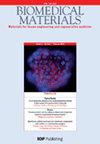Three-dimensional culture and chondrogenic differentiation of mesenchymal stem cells in interconnected collagen scaffolds
IF 3.7
3区 医学
Q2 ENGINEERING, BIOMEDICAL
引用次数: 5
Abstract
Interconnected scaffolds are useful for promoting the chondrogenic differentiation of stem cells. Collagen scaffolds with interconnected pore structures were fabricated with poly(lactic acid-co-glycolic acid) (PLGA) sponge templates. The PLGA-templated collagen scaffolds were used to culture human bone marrow-derived mesenchymal stem cells (hMSCs) to investigate their promotive effect on the chondrogenic differentiation of hMSCs. The cells adhered to the scaffolds with a homogeneous distribution and proliferated with culture time. The expression of chondrogenesis-related genes was upregulated, and abundant cartilaginous matrices were detected. After subcutaneous implantation, the PLGA-templated collagen scaffolds further enhanced the production of cartilaginous matrices and the mechanical properties of the implants. The good interconnectivity of the PLGA-templated collagen scaffolds promoted chondrogenic differentiation. In particular, the collagen scaffolds prepared with large pore-bearing PLGA sponge templates showed the highest promotive effect.胶原支架间充质干细胞的三维培养和软骨分化
相互连接的支架可用于促进干细胞的软骨分化。用聚乳酸-乙醇酸(PLGA)海绵模板制备了具有互连孔结构的胶原支架。利用PLGA模板胶原支架培养人骨髓间充质干细胞(hMSCs),研究其对hMSCs向软骨分化的促进作用。细胞以均匀的分布粘附在支架上,并随着培养时间的推移而增殖。软骨生成相关基因的表达上调,并检测到丰富的软骨基质。皮下植入后,PLGA模板胶原支架进一步增强了软骨基质的产生和植入物的机械性能。PLGA模板胶原支架的良好互连性促进了软骨分化。特别是,用大孔PLGA海绵模板制备的胶原支架显示出最高的促进作用。
本文章由计算机程序翻译,如有差异,请以英文原文为准。
求助全文
约1分钟内获得全文
求助全文
来源期刊

Biomedical materials
工程技术-材料科学:生物材料
CiteScore
6.70
自引率
7.50%
发文量
294
审稿时长
3 months
期刊介绍:
The goal of the journal is to publish original research findings and critical reviews that contribute to our knowledge about the composition, properties, and performance of materials for all applications relevant to human healthcare.
Typical areas of interest include (but are not limited to):
-Synthesis/characterization of biomedical materials-
Nature-inspired synthesis/biomineralization of biomedical materials-
In vitro/in vivo performance of biomedical materials-
Biofabrication technologies/applications: 3D bioprinting, bioink development, bioassembly & biopatterning-
Microfluidic systems (including disease models): fabrication, testing & translational applications-
Tissue engineering/regenerative medicine-
Interaction of molecules/cells with materials-
Effects of biomaterials on stem cell behaviour-
Growth factors/genes/cells incorporated into biomedical materials-
Biophysical cues/biocompatibility pathways in biomedical materials performance-
Clinical applications of biomedical materials for cell therapies in disease (cancer etc)-
Nanomedicine, nanotoxicology and nanopathology-
Pharmacokinetic considerations in drug delivery systems-
Risks of contrast media in imaging systems-
Biosafety aspects of gene delivery agents-
Preclinical and clinical performance of implantable biomedical materials-
Translational and regulatory matters
 求助内容:
求助内容: 应助结果提醒方式:
应助结果提醒方式:


